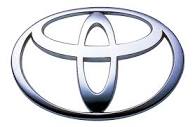Van Wagon 2WD L4-2237cc 2.2L (4Y-E) (1989)
/Page-780002.png)
SUBJECT:
VEHICLE MODIFICATIONS
This letter contains important information regarding vehicle modifications which can affect compliance with Federal Motor Vehicle Safety Standards.
Toyota continues to receive reports through the U.S. Department of Transportation regarding alleged safety related problems on vehicles which have
undergone major modification by second or final stage manufacturers after leaving Toyota's possession. As in prior years, we want to again remind you
of certain provisions of the National Traffic and Motor Vehicle Safety Act (the Safety Act), the Federal Motor Vehicle Safety Standards (the Safety
Standards and related regulations) which impose legal responsibilities on you that may significantly affect your dealership operations.
The information contained in this letter is to be considered general information only and presents some examples of the compliance issues related to the
sale of new and used vehicles. It is essential that you and your dealership personnel become thoroughly familiar with this subject and that you consult
your own legal counsel regarding the effect the matters covered herein may have on your business.
For more than 20 years now, since January 1, 1968, it has been illegal for a manufacturer, distributor or dealer to sell any new motor vehicle which does
not comply with the Safety Standards in effect at the time the motor vehicle is manufactured. Each such illegal sale is subject to a penalty of up to
$1,000.
Alterations of Certified Vehicles
Every complete vehicle produced by Toyota Motor Corporation carries a label certifying that the vehicle complies with all applicable Safety Standards
which were in effect at the time of manufacture. As a general rule, this certification is not valid if:
^
The dealer (or distributor) altered the vehicle and the alteration was the cause of non-compliance with federal standards; or
^
The dealer (or distributor) did not alter the vehicle in any way, but the dealer or his personnel had knowledge that the vehicle as sold did not
comply in some respect.
The following are some examples of alterations which can result in dealer responsibility for the loss of certification;
^
Reworking vehicle bodies for appearance reasons, "stretching" bodies to provide additional seating capacity, or altering bodies into
convertible configurations;
Such modifications could result in non-compliance with a number of Federal Motor Vehicle Safety Standards (FMVSS) including, for example,
FMVSS 214, the standard on side door strength;
^
Installation of modified fuel systems with increased capacity or auxiliary fuel tanks;
This type of modifications could result in non-compliance with FMVSS 301, the standard on fuel system integrity;
^
Removal of the original tires installed by the factory and the substitution of tires of non-equivalent size, even if specially ordered by the
customer;
FMVSS 109 would be violated if the substituted tires do not carry the tire manufacturer's certification of compliance label.
There would be non-compliance. with FMVSS if the weight of the vehicle is such that the load on the substituted tires exceeds the applicable
tire load limits established by FMVSS 110 for those tires;
The bumper performance requirements in Part 581 of Title 49 of the Code of Federal Regulations would be violated if the substituted tires
change the standing height of the vehicle's bumper so that the bumper is not positioned properly to meet the pendulum impact requirements of
this regulation. The substitution of tires of a different size and/or carcass construction than the tires originally installed by Toyota Motor
Corporation can result in a significant change in this standing height;
In addition, a number of states have adopted laws against raising or lowering vehicle bodies beyond certain limits.
^
Replacement of the factory-installed wheels with certain "stylized wheels" or dual rear wheels;
FMVSS 105/75 would be violated if the replacement wheels resulted in the vehicle not meeting the braking performance requirements of this
standard. There would be non-compliance with FMVSS 110 if the replacement wheels could not meet the requirement of retaining a deflated
tire following a rapid loss of inflation pressure at 60 miles per hour;
FMVSS 211 would be violated if the replacement wheels incorporate wheel nuts, hub cap or wheel disc which constitute "winged projections";
In addition, installation of the dual rear wheels on pickup trucks could overstress the original suspension components, resulting in component
failure and loss of vehicle control.
Technical information and guidelines for the 1989 Toyota Cargo Van can be found in "Cargo Van 1989 Technical Information" (P/N 00411-01965)
which can be ordered through your Regional/Private Distributor office.
